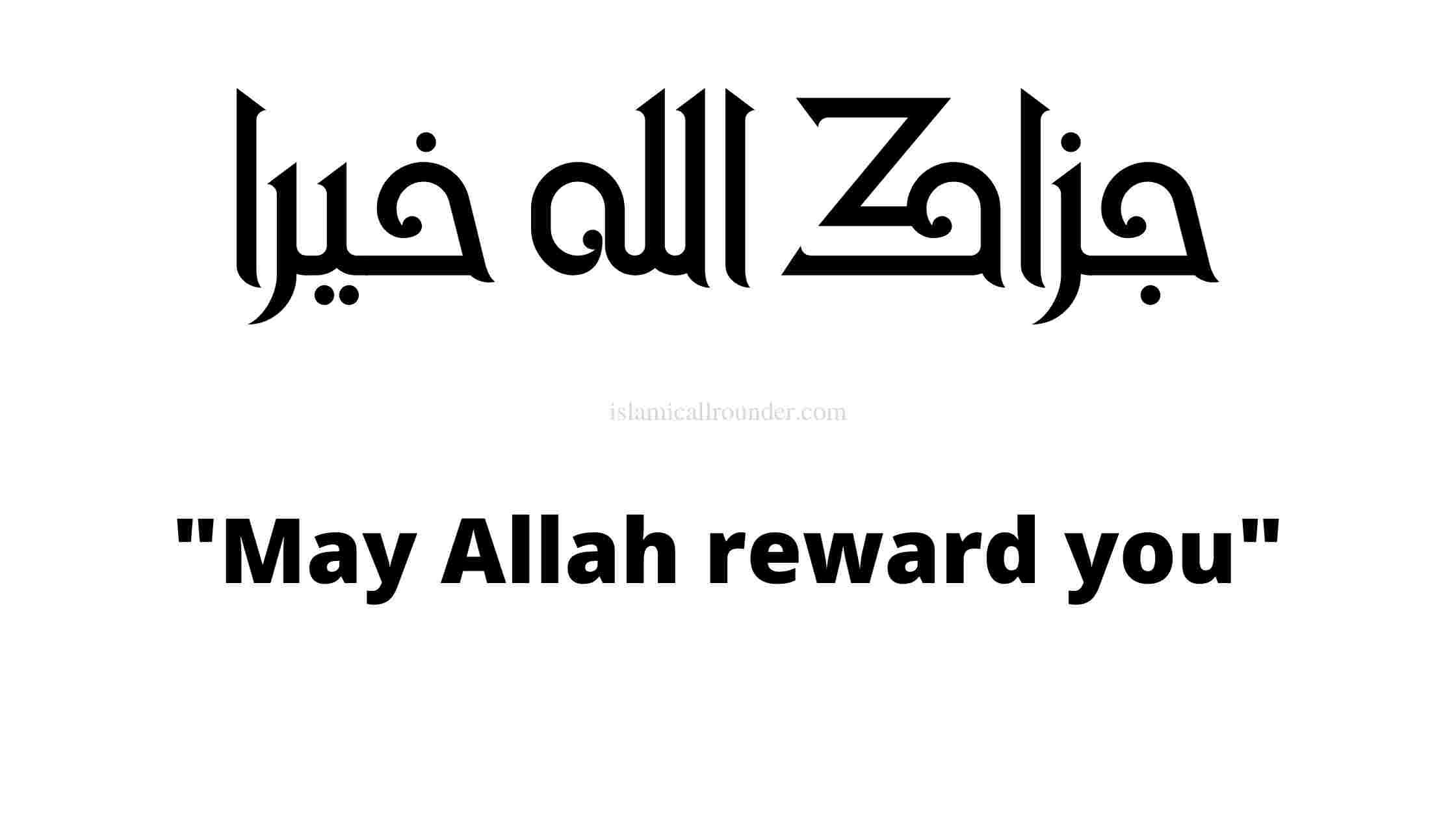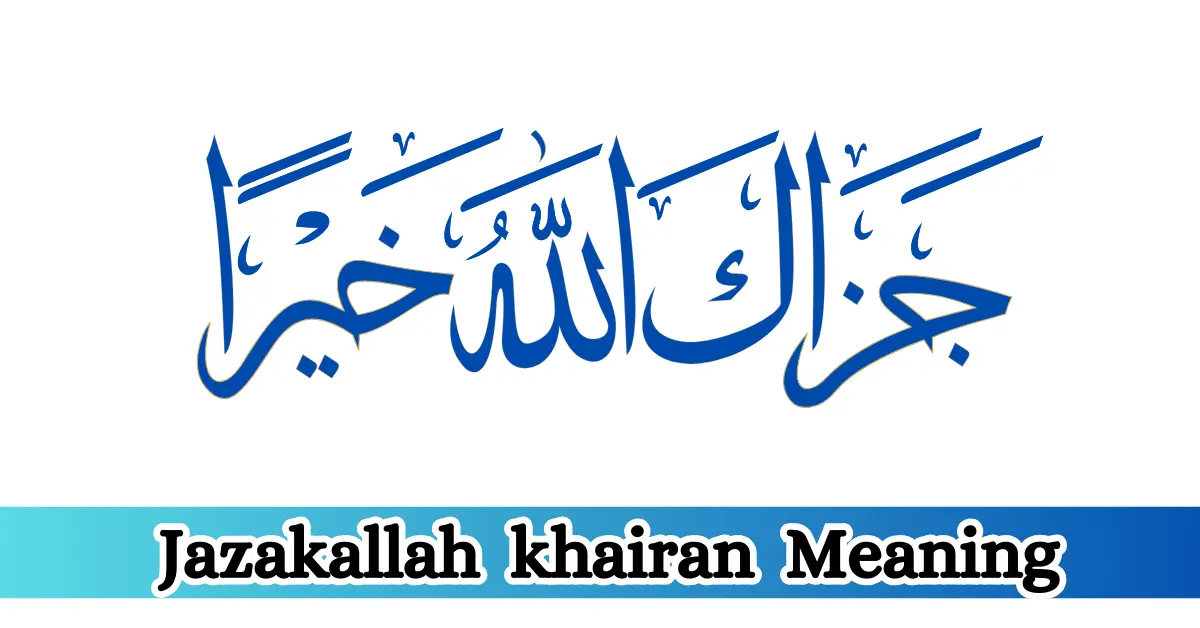“Jazakallah Khairan” is a profound and meaningful phrase used in the Islamic faith, representing a heartfelt expression of gratitude. Understanding the “Jazakallah Khairan meaning” enhances your knowledge of Islamic culture and deepens your appreciation of its spiritual and social significance. This article will explore this beautiful phrase’s origins, proper usage, and more profound implications.
When you are pleased with someone, thank him. The following words are also used in Arabic for this meaning: jazak Allah. You can use it in your everyday life.
It is much better than other words that we pay for someone’s services. Paying for it also gets the reward in religion—every happiness a Muslim receives. But we should keep on giving thanks to Allah.
Jazak Allah khair in Arabic
Men and women will pay special attention to the words in its payment in Arabic:
- For a man—-جَزَاکَ اللَّهُ خَيْرًا
- For a woman—-جَزَاکِ اللَّهُ خَيْرًا
- Plural form—-جَزَاكُمُ اللَّهُ خَيرًا
We should also call the employees working in our homes, drivers, financiers, milk delivery, garbage collectors, etc. “Jazak Allah Khaira”.
This will make arrogance come out of our hearts. We should arrange for our wives and children to say this prayer on every small and big task and teach them to say it.
What Does Jazakallah Khairan Mean?
“Jazakallah Khairan” is an Arabic phrase that translates to “May Allah reward you with goodness.” It expresses gratitude and appreciation, invoking Allah’s blessings and rewards for the person being thanked. Muslims often use this phrase to show thankfulness for acts of kindness, assistance, and generosity.
Breakdown of the Phrase
To fully grasp the “Jazakallah Khairan meaning,” it’s helpful to break down the phrase into its components:
- Jazakallah: “Jazaka“ means “may He reward you,“ and “Allah“ refers to God.
- Khairan: This means “goodness“ or “good.”
Proper Usage in Context
“Jazakallah Khairan“ can be used in various contexts, including:
- Personal Gratitude: Thanking someone for a personal favour or act of kindness.
- Formal Situations: Expressing appreciation in more formal or communal settings.
- Written Communication: Including the phrase in letters, emails, or messages to convey sincere thanks.
Cultural and Religious Significance
Spiritual Implications
The phrase “Jazakallah Khairan“ carries significant spiritual weight. It’s not merely a way of saying thank you but a prayer for the recipient’s continued blessings and divine favour. By using this phrase, Muslims are reminded of the importance of gratitude and the role of Allah in all aspects of life.
Cultural Practices
In many Muslim-majority countries, “Jazakallah Khairan“ is integral to daily interactions. It reflects a deep-rooted cultural norm of expressing thanks and appreciation respectfully and spiritually upliftingly.
How to Respond to Jazakallah Khairan
Understanding the appropriate response is also crucial. When someone says “Jazakallah Khairan“ to you, a suitable reply is:
- Wa Iyyakum: This phrase means “and to you,“ and it reciprocates the blessing.
- Barakallahu Feek: This means “May Allah bless you,“ and it is another way to extend the sentiment of goodwill.
Incorporating Jazakallah Khairan in Daily Life
Enhancing Social Bonds
Using “Jazakallah Khairan“ can strengthen social bonds by fostering a culture of gratitude and mutual respect. It encourages positive interactions and reinforces the value of kindness and generosity.
Personal Reflection
Incorporating this phrase into your daily vocabulary can also serve as a personal reminder of the importance of being grateful and recognizing the contributions of others.
Jazakallah khair Meaning in English
It means “May Allah reward you” Some people just say this, jazak Allah, although this is not the meaning, so it should be said. jazakallah khairan

Syeda Ayesha narrates that she borrowed Her from Syeda Asma (RA) and lost it. The Prophet (peace and blessings of Allaah be upon him) sent a man to look for him, and he found him. Then, it was time for prayers, and people did not have water. They offered prayers (without ablution). When this was complained about, Allah Almighty revealed the verse of tayammum.
(On this occasion) Syedna Used bin Hudhair said to Ayesha: jazakallah khairan “May Allah reward you the best. Whenever something that causes you distress happens to you, Allah has made it good for you and all Muslims.
Jazakallah khair Importance
- Abdullah ibn Umar narrates that when my father was wounded (with a dagger), I went to him. The Companions started praising Umar and saying: jazakallah khairan “May Allah reward you the best Omar said: I have hope from Allah, and I am afraid.
- The Holy Prophet bought camels from a Bedouin in exchange for dates. When he told Arabi dates were unavailable at home, he started wailing about deception.
- Upon this, the Prophet asked Syeda Khula bint Hakim about dates and sent the Arabi to her. Later, when the Arabi passed by the Hazrat Muhammad (PBUH), he said: jazakallah khairan May Allah reward you the best, you have paid the full and excellent.
- Hazrat Jabir narrates that Hazrat Muhammad (PBUH) said: O Ansar! May Allah reward you, especially Al-Amr bin Haram and Saad bin Ibadah.
- It is narrated on the authority of Abo Horaira that Hazrat Muhammad (PBUH) said: He who does not give thanks to the people does not give thanks to Allah.
- Hazrat Ayesha’s custom was that when a beggar prayed for her, she would pray for him in the same way and then give him alms. When people asked him why, she said that if I did not pray for him, his right and my right would be equal because I gave him only charity when he prayed for me. So I also pray for him so that my prayer may be the reward of his prayer and the charity that I have given may be pure.
- Even today, the Arabs exchange prayers in the same way. Whenever they meet someone, they do not fail to give each other the gift of prayers. Still, we non-Arabs, and especially the Muslims of the subcontinent, are unaware of this beautiful gift of Islam, and even if they are aware, they often fail.
Frequently Asked Questions
What is the exact translation of Jazakallah Khairan?
“Jazakallah Khairan“ translates to “May Allah reward you with goodness.”
Can non-Muslims use the phrase Jazakallah Khairan?
Non-Muslims can use the phrase to express gratitude to Muslim friends or colleagues. It is seen as a respectful acknowledgement of their culture.
What is the difference between Jazakallah and Jazakallah Khairan?
“Jazakallah“ means “May Allah reward you,“ while “Jazakallah Khairan“ adds the element of “with goodness,“ making it a more complete and thoughtful expression.
Is there a shorter way to say Jazakallah Khairan?
While “Jazakallah“ can be used, adding “Khairan“ makes the phrase more comprehensive and generally preferable.
How do you pronounce Jazakallah Khairan?
The phrase is pronounced as “Jah-zah-kah-lah khay-ran.”
Can Jazakallah Khairan be used in written communication?
Yes, it is commonly used in emails, letters, and messages to convey sincere thanks and blessings.
Conclusion
Understanding the “meaning of Jazakallah Khairan“ enriches your knowledge of Islamic culture and allows you to engage more deeply with its traditions of gratitude and goodwill. By incorporating this phrase into your daily interactions, you express thanks meaningfully and foster a sense of community and spiritual connection. Whether you are a Muslim or someone who interacts with Muslim friends and colleagues, using “Jazakallah Khairan“ can enhance your experience and relationships.
See From Us:
